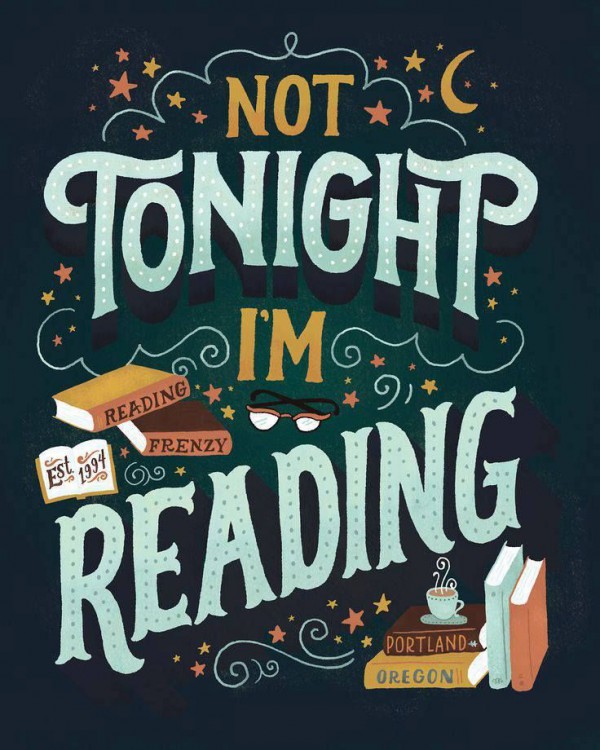The 14 Stages of Book Addiction from Buzzfeed!!
2. You’re a few pages in thinking “I mean, I don’t really see what all the fuss is about.”

3. Fifty pages in and now you need to know what happens. You NEED to know.

4. You look forward to even a few minutes of downtime because that is precious reading time.

5. Sleep is no longer important since these late hours in the night are when no one disturbs you and asks “what are you reading??” as if holding a book in front of your face is not enough of a ‘please do not disturb’ sign.

6. An internal conflict starts to develop as part of you wants to know how the story ends and the other part of you can’t bare the thought of life without this book.

7. You become unhealthily attached to the main characters, especially if the narrator is in love with the novel equivalent to your prince charming.

8. You think you might love a character more than you love your actual boyfriend.

He just gets you in a way that can’t be explained to the mentally stable
9. You start to become the book’s biggest marketing tool as you preach about the literary masterpiece to your friends.

“Oh my god you have to read this book! NO LIKE YOU HAVE TO!”
10. Reality is no longer of importance. Your taxes can wait, the main characters are in danger!!

11. If something tragic happens to the main character or your book boyfriend, you cry for your loss and because literally no one around you cares about your mental anguish.

12. You finish the book and your heart aches as you say goodbye to those characters forever.

13. Walking into a bookstore afterwards is like being thrown back into the dating world after getting dumped.

14. You find a flaw in every book you pick up and realize you’re just not ready to get back out there.

*repeat stages 1 through 14*

S, or Literary Scholarship Can Be Exciting Too!
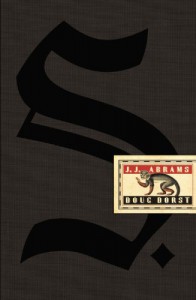
Whatever the reception of this book ultimately was, it can't be denied that S is a masterpiece. A story about a story within a story about another story, with footnotes from another story, being written about by another story. It's meta, it's beautifully written, and it's compelling as hell. Even when I was completely submerged in the horror or suspense of the moment, there was always some part of me delighting in the very fact that this book exists.
Let me try to describe the structure of this (and fail miserably, of course. You'd really have to read it for yourself). Mysterious author Straka wrote a book called Ship of Theseus, among others. It's the story of an amnesiac man who realizes he's part of a great conspiracy he doesn't remember, but people seem to know his identity and what his mission is. He ends up on a ship full of gruesomely mutilated sailors and travels across the world in search of a woman named Sola. This book is filled with allusions to a real life conspiracy, a group called S, of which Straka (whose identity is unknown) was a member. He would publish his story via letters to F.M.X., the translator, whose footnotes tell another fascinating story about F.M.X.'s own relationship with the enigmatic Straka,
Enter modern day literary enthusiasts Eric and Jen. Jen picks up Eric's copy of Ship of Theseus in the library one day and sees all his notes. She writes back, and thus begins a back-and-forth correspondence with him in the margins of his book. There's no shortage of drama there, either, in Eric's clashes with unscrupulous Straka academics, the growing suspicion that a clandestine organization like S is not at all fictional and very much active, and Jen and Eric's burgeoning romance.
This is possibly the only time I've ever been delighted with the unabashed debasement of a library book. Jen and Eric's notes in the margins were ridiculously charming and funny, when they weren't being fascinating. Even their personalities would come out in their handwriting -- Jen's was a warm looping script while Eric wrote in sparse, blocky print. Having Eric confess he liked her was like a happy kick in the guts to me -- partly because he wrote the note rather early in the book (though in the middle of the story), but mostly because his personality was originally closed off, cynical, and rather sparse. It just shows how far they've changed each other.
My one complaint is that due to the many stories ducking and weaving alongside each other, it was sometimes difficult to keep the thread of the story together, especially with Jen and Eric's. The changing color of their ink pens helped, but I wish I could see their story play out chronologically. This means I probably have to read the whole thing all over again.
(Yay!)
Forged in Blood I, or The Emperor's Edge Remix
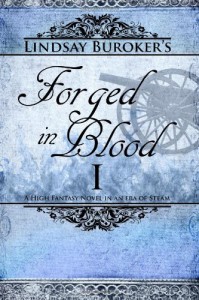
While Lindsay Buroker once again enthralls me and renders the rest of my plans for the day to waste, I have to say that Forged in Blood doesn't quite live up to the promise of the rest of her books. It may be just as (or possibly more) action-packed than her other stories, but the content hasn't changed all that much. She seems to have just rehashed old situations in newer forms, with different characters. It's an endless merry-go-round of failed infiltration, explosions, escapes of the skin-of-your-teeth persuasion, and even the same monsters and enemies -- at the end of the book, it looks like we're in for yet another railway adventure. Some jokes may actually start to have grown a bit old.
Not that this dampens my enthusiasm for the series. My affection for Amaranthe and her ragtag group of rebels remains as fondly exasperated as ever. Sicarius's attempts to form a bond with Sespian were possibly my favorite part, because the man, normally so inhumanly capable and self-possessed, has absolutely no idea how to deal with his son. This relationship takes center stage, with a few sweet interludes between Amaranthe and Sicarius peppered in between.
At this point, though, I feel that Buroker should have given the evil criminal organization Forge more definition by now -- or at least a face to focus the story on. Ravido is a figurehead, Pike is dead, and although Worgavic is obviously highly placed, she doesn't actually have much to do in this book, other than appear and be suitably outraged at Amaranthe's antics. I get that Forge is meant to be shadowy and legion, but by this time there should be a bit more direction to the story than "put Sespian back on the throne and hope that killing some Forge members will let us finally get back to the inevitably entertaining Sicarius-Amaranthe nookie."
Maybe I've been spoiled -- Lindsay Buroker's given me so much to delight over. As much as it pains me to do it, this is just a three-star book for me. Fingers crossed the second half changes my mind.
Authors for the Philippines: Online Auction!
An online auction set up by my writer pal and all-round excellent human being Keris Stainton in aid of those affected by the recent hurricane in the Philippines. All proceeds go directly to the Red Cross.
How does it work? Simple. Click on the link, view the assorted goodies available and bid via the comments.
What can I get? All sorts of awesome stuff, from signed copies of books, to having a character named after you in an author's next work.
GO!! BID!! SHARE!!
Beau Brummell, or Inventor of the Original Skinny Jeans
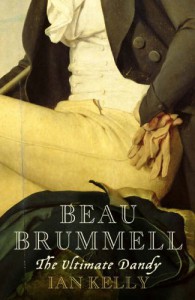
Ian Kelly's Beau Brummell is a fantastic biography, painstakingly researched and dissected, but never entirely disconnected. Brummell is portrayed in a light that is alternately harsh and sympathetic. Though the novel praises his genius and wit in rising above his station to the very firmament of London society, it also censures his inability to live economically and his slavish devotion to his image, as well as his cruel little bon mots. It gives us an enchanting glimpse of the sparkling ballrooms of London, the intricate whirls and dances of society comportment and the lives of the rich and famous. Having read many books about this time period, it was delightful to see names that I've come across in fiction, not realizing they were real people after all (Lord Alvanley, for instance, and Lady Georgiana). It also shows this glittering beast's vast and rather disreputable underbelly, the world of Cyprians and gaming clubs, which together lead to Brummell's ultimate downfall.
I wonder, if Brummell had never burst into the scene with his impeccable taste, what would men be wearing today? Or women, for that matter? Would men still be wearing breeches and buckles, with flowery waistcoats and powdered wigs? Without Brummell to inspire Coco Chanel, would women never know the freedom of a good pair of trousers?
I've had this image in my head of Brummell ever since I first read about him in a Georgette Heyer novel (developed a bit of a crush on him, full disclosure), but I never read more than his Wikipedia page until now. He was, for all his faults, a rather remarkable man. I wish I could have half his eloquence and social ease, the way he effortlessly won everyone over even in France, where his fortunes had dwindled to practically nothing. I still wish men had even a fraction of his devotion to cleanliness and appearances, because good lord, will it kill them to dress up a little bit once in a while?
It's easy to dismiss Brummell as a fop, a fribble of a man who met an ignominious end, but when you realize much we owe this dandiest of dandies, not just in fashion but in literature and manners as well, it's pretty stunning to see how far reaching his influence was and continues to be.
The Rosie Project, or Look Ma, No Manic Pixie Dream Girl!

I could see it now: Our hero, entrenched in his monochromatic stagnant ways, seeking a way out of the tunnel of his loneliness and into the technicolor whirlpool of life vis a vis a romantic partner. It's a setting ripe for the emergence of that most complicated and terrible of tropes: the Manic Pixie Dream Girl. It was with trepidation that I read on.
Thankfully, my fears were unfounded. Rosie is, compared to Don, a normal girl. In fact, she is as far away from being a mere quirky object of the hero's affections as it is possible. She's not actually all that quirky -- Don merely finds her strange because he finds everyone strange. Whatever quirks she does have (dyed hair, vegetarianism, a penchant for pendants), Don just takes these things in stride. She has a backstory of her own -- arguably more of a backstory than Don himself -- and it's this which in fact forms the backbone of the entire story. This may start out as Don's story, but Rosie's own insecurities and problems play out centerstage, with Don as the prime mover. An interesting combination.
For a while, I considered the possibility that it was Don himself who played the Manic Pixie Dream Guy. He certainly is quirky enough, but I dismissed the idea almost immediately. Obviously, the man has his complications, his problems, and is proactive in solving them -- even if he does go about them in the wrong way. His story arc is more about opening up to possibility and decentralizing his life, but also in accepting that everyone is pretty weird, too. Still, Don's thought processes are charming, hilarious, sad, and sometimes completely relatable.
So while I give the romance three stars (I get that Don has difficulty expressing and even identifying his emotions, but Graeme Simsion still could have perhaps elicited that delicious gut punch of emotion from us anyway), the comedy and characterization gets a solid five stars from me.
Where Have All the Mean Book Reviews Gone?
I do love a good public literary throwdown.
The Luckiest Lady in London, or Now I Remember Why I Like Romance Novels

Do not read this book unless you're willing to forgo an evening and all the useful things you could have done with your time (it's perfect, however, as a tool for procrastination). I wasn't looking for a new romance author to enjoy, but Sherry Thomas just threw the doors open, barged in and kept me up until the birds outside started telling me I'd better get some sleep.
To the fancy London set, Felix is known as the Ideal Gentleman, a man beloved by all who can do no wrong. This couldn't be further from the case, but he plays up his image and never makes a move without calculating how it could best add to his power and control. Obviously you know there's some unhappy childhood backstory that started the desire for all this cold manipulation, because there always is, and truthfully, his is pretty bleak.
And then we have Louisa, who is a genteel nobody hell bent on securing herself a match this Season. She needs to marry because her family is all sisters, and one of them epileptic besides. Louisa is only passably pretty, she has raunchy dreams, and her chest is flat (yay!), but a carefully plotted concoction of makeup, the appearance of a demure and agreeable personality, and bust enhancers combine to make her a success in society, if not in marriage.
When the two meet, they see through each other's artifices almost immediately. And so it begins.
The road to happiness is long and winding for these two, because neither of them trust the other, despite being nearly exactly alike. They both know how to hurt each other in the keenest ways and are absolutely wary of letting each other in, and yet they both share a passion for astronomy, which was a delightful element to their romance. I like nerdy heroes or heroines, but having both was an unlooked for gift.
Felix and Louisa are a pair of bold, complicated, vulnerable, and manipulative characters and they deserve each other. Happily so.
 1
1
Fortunately, the Milk, or Fortunately, the Art

Honest disclaimer? Skottie Young's art is the only reason I bought this. He's the only reason I'm giving this book stars.
This is a short quick read that doesn't quite seem to know its target market. Certainly, it's packaged like a children's book, with Skottie Young's wonderful illustrations and many fantastical situations that the protagonist finds himself in. Yet sometimes, the characters would make comments that would be completely lost on children, Gaiman's little nudge-nudge wink-wink to the older audiences he probably knew would buy the book because his name was on the cover.
Which isn't bad in of itself, but the treatment was slapdash. Adventure Time does a better job with its smooth and completely natural injections of adult humor. I wonder if Gaiman tested this story with actual children.
Still the story was solid enough. You can't quite go wrong with time travelling dinosaurs.
More often than I would have liked -- the whimsicality of the plot seemed too forced. I don't mean to be cynical, but even a child would have scoffed at some of the things that happened here. I've read children's books to children and the experience taught me that we tend to underestimate how rational they can be about certain things.
I don't understand why this book fell flat -- Neil Gaiman did such a splendid job with Coraline at not talking down to his audience. Why couldn't he have done the same with Fortunately, the Milk?
Thank god Skottie Young continuously saved the day with his art. Most of the time I spent drinking up every line and stroke of his drawings and the magnificently comic way he illustrates the most fanciful of creatures. If anything, I hope this book at least opens up plenty of projects for him in the future, because the world needs more Skottie Young.
Wolf Hall, or an Abundance of Thomases
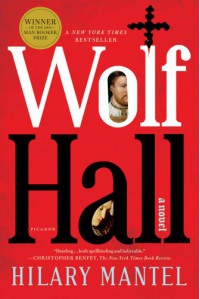
Having confused Thomas Cromwell with Oliver Cromwell (understandably, I think -- besides, it turns out that they’re related through Thomas Cromwell’s sister, so it’s not that much of a stretch), my expectations of this book were a little skewed. It was only when I reached the latter half of the book when I realized my knowledge of history wasn’t matching up with the events in the story, and Wikipedia confirmed my error. So whoops.
At any rate, it was a compelling read, even as it completely derailed my understanding of Thomas Cromwell. Hilary Mantel is an unparalleled master of the written word.
"The page of an accounts book is there for your use, like a love poem. It's not there for you to nod and then dismiss it; it's there to open your heart to possibility. It's like the scriptures: it's there for you to think about and initiate action. Love your neighbor. Study the market. Increase the spread of benevolence. Bring in better figures next year."
With this paragraph alone, Mantel paints an excellent picture of Thomas Cromwell's character. He's the kind of man who would equate business with poetry, with religion. Cromwell was not a man to sit around wringing his hands -- what with the business of building up an efficient and lucrative business and managing the affairs of the king, he had better things to do with his hands.
Not to be outshone, of course, are Henry VIII and Anne Boleyn. Is Henry VIII a figure to be pitied as a royal puppet, crippled by his endless entourage of sycophants yet possesed no real power to make decisions of his own? Or is he to be reviled as a spoiled and insatiable horndog for whom one woman was pretty much the same as the next, tossing generations of law and custom out the window just to have the one who wouldn’t tumble into bed with him?
And what of Anne, whose complexities and political machinations were formed as much from her own ambition as the society around her?
"You see," she says slowly. "I was always desired. But now I am valued. And that is a different thing, I find."
The only avenue for success for a woman back then was marriage, and who can blame a girl who wants to rise to the top, against all the odds? Yes, she did break up a royal marriage (thus incurring a whole host of political problems for the crown), cast a large number of politicians and Cardinal Wolsey into disgrace, and inadvertently overthrow the entire religious and legal history of England, but hey, a girl’s gotta do what a girl’s gotta do, right?
Or is the true culprit here ye olde English society, regarding women as nothing more than broodmares for the all-important task of perpetuating the royal line? Nobody forced the Boleyn family to hurl their daughters at Henry, and everyone was too busy toadying up to him to stop and say “wait a minute sir this is possibly a bit extreme.”
Well, I don’t know. Greater historians than I (not that I consider myself one, because my pretensions only extend as far as my bias) probably have lengthy and better informed debates that go down to minutiae.
And all throughout, Thomas Cromwell, proof that one can scrabble one's way up out of the dirt from whence one came and into self-made prominence. With the king's ear in one hand and the king's purse in the other, Cromwell was the man who made things happen, with a whispered word here and a palmed coin there.
 1
1
 1
1
Ordinary People, or The Book of Painful and Subdued Feels
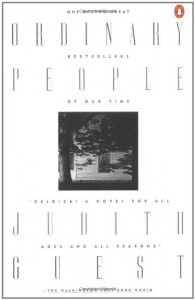
Robert Redford's adaptation of Ordinary People has always been one of my favorite psychological films of all time, but I had no idea it was based on a book (heap shame on me, all of it).
The narration dives straight into each character's thoughts and swims along, flashing this way and that in a stream of consciousness that really does pull you straight into the water too. You feel the panic that swallows Conrad up, bearing you along relentlessly down the hole with him. You feel as trapped as Cal does by his frustration with himself and his inability to hold his family together. You even begin to understand things from Beth's perspective, grudgingly and ultimately with unexpected compassion for a woman who cares so much she fears the showing of it.
The movie was a stirring masterpiece -- to this day, I cry whenever I see Conrad weeping in Berger's office or Cal sitting in the darkened dining room. Though the movie adds greater force to the story's emotion, the book sheds better light not just on the Jarretts but also the rest of the world the Jarretts live in. Jeannine is fleshed out, not just the one pretty girl who tolerates Conrad's company but one who grows to find comfort in him as much as he does in her.
So much of why I love the movie was lifted straight from the book's deep understanding of loss and human nature. The film saw no need to change Berger's powerful conversations with Conrad, or Beth's wrenching outbursts. Although Cal's heartbreaking "I don't think I love you anymore" never appears in the book, it builds up and manifests itself as a storm that finally breaks at the end. The book ends more hopefully, with Conrad contemplating reconciliation with his mother one day and rebuilding the friendships he lost.
I have so much to say about this book, about how the themes of forgiveness and understanding are in this story, or how masterfully Guest portrays a family spiraling apart despite the threads of love that still bind them.
In Ordinary People, there is no protagonist who stands above reproach, no villain with malicious intent. It may start out that way, but over time everyone in this book reveals that they are really just ordinary people, with ordinary desires and limitations they sometimes just can't overcome. Just like us.
Fangirl, or I Reject Your Reality and Substitute It with My Own

The Drowning Guard, or Hurry Up and Fall In Love With These Characters
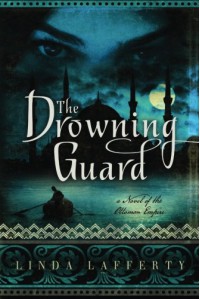
Please don’t be misled by the terrible cover. It is the only bad thing about The Drowning Guard. This is actually a terrific book marred only by that atrocity on its face, rather like how I am a terrific person, marred only by the atrocity that is my face.
At first I was pretty lukewarm about the story and the characters. Yes, the prose was lush and vibrant (adjectives that are so commonly used in stories about the Ottoman empire that now I feel like I cheated a little) -- when Lafferty describes scenes in the marketplace you really get the feel that it’s a cultural melting pot, with people impatiently shouting at each other and activity spilling over everywhere you look. There’s also something almost fairy tale-like to the way she narrates her characters, often calling Ivan “the giant” or “the janissary” instead of by his name.
And then I got to this part of the story.
Scene: It’s the second night Ivan sits with Esma. She’s lounging around like a spoiled queen, baiting him in her carelessly spiteful way. She knows Ivan hates her for the murders she forces him to commit, but she doesn’t care.
When he sees one of her hot slave girls walking around with her face on display (outrageous!), he asks why the women of her harem go about unveiled. And she says:
“A veil is an invention of man to protect what he feels is his property. None of my slaves wear the yasmak; we show our faces to Allah without shame.”
With that, I knew Esma was going to surprise me. I expected that there had to be some sort of backstory to make her that way and figured that a change of heart was inevitable.
But what a backstory.
Esma does what she does to defy the injustices men inflict daily upon women. In her own way, she exerts her brand of power over man, raging against the fact that as a woman she has no real power except what her brother allows her. She does it to exact revenge upon them for what they did to her best friend -- and maybe in frustration because she knows she is the equal (or more) of any sultan who has ever sat on the throne. She has created her own little world within her palace, the only place in the whole empire where women can feel safe and free to be themselves without punishment. Esma knows how to play the game within the confines of her cage, and skillfully manipulates her own brother to protect those she has taken under her wing. Esma has the biggest heart of all perhaps, and it bleeds for women everywhere. Esma, selfish murderer of men. Esma, holy protector of women.
There’s no end to the things I want to say about her. She’s such a fascinating character, with layers of rich motivations covering a fierce core of independence and yearning. Calling her a feminist would barely scratch the surface of her.
Ivan poses a fascinating character study himself, constantly caught between things like the hem of a long straggly dress. Though he is introduced to us as a janissary man faithful to his adopted religion through and through, over time his impassive facade cracks. He often wheels between his Christian origins and his choice to follow Islamic faith. As a soldier of the empire, he values loyalty to the throne but as a janissary, his independence of spirit is what makes him who he is. He refuses to accept his attraction to the woman who turned him into a murderer, but soon starts to see her as a woman whose motivations he understands and even begins to share.
I am not even a little bit done, but I’m cutting this short. You don’t have to read all this drivel I'm spouting, but do read The Drowning Guard.
Trust me, it’s worth it.
What do your bookshelves say about your personality?
I'm a Conqueror with an insurmountable To-Read pile. (Thanks, impulse buying!)
Raven Flight, or Marillier Friendship is Magic

Raven Flight wisely lets the romance fall by the wayside to focus on the rebellion and Neryn's progress as a Caller. I say wisely, because I was never really too sold on Flint as a love interest. Life at Shadowfell is fascinating and if what exactly the rebels are doing to win freedom is sort of vague, it's more than made up for with the interesting characters that make up the Shadowfell rebellion.
Tali, specifically. In the first book, she comes off as a sour and suspicious warrior lady. Which she is, but there's obviously more to her than that. She gradually warms up to Neryn, but maintains her aloof and stern warrior mien until about the very end, when you realize that underneath all those knives and prickly words, she's just a girl, too. With her rich backstory and her hidden yet rather complicated feelings, she's as much a Marillier heroine as Neryn is.
I'm not going to let all this Tali love cause the Neryn Appreciation Party to fall by the wayside. (Also, announcement: there is now a Neryn Appreciation Party, population: me) After the first book, I wrote her off as bland and forgettable. I suppose it's because most of the first book was her agonizing over her family and falling ill and wafting on whether or not to trust Flint, and all of that got a bit tiresome after a while. This time around, Neryn is set on her path as a Caller and the determination that drove her through her many miseries in book one finally shines out. I'm amazed with her ability to deal with all sorts of crazy shit happening to and around her and still be patient and really nice to everyone. If it were me I'd probably retreat into a cave somewhere and let the world outside fall apart.
Neryn and Tali start out without much of a relationship besides woefully unfit student and training tyrant. When they're forced to journey together, it takes a while for them to get used to each other because everything about Neryn is soft and everything about Tali snarls at you to back the fuck off. I won't go into detail about that one moment where you realize that they've truly grown to care for each other, but I'll admit that it did hit me as hard as Sorcha screaming Red's name for the first time in Daughter of the Forest. And that's saying something.
Along the way, we get to marvel at the sights of Marillier's fantastic new world, and to feel vaguely ill at the mess evil King Keldec has made of it. I have hopes of seeing the Hag and the Lord of the North again, possibly in the final confrontation that seems imminent, because our time with them was pitifully short. We see more of Keldec now, and there appears to be a Lady Macbeth sort of thing going on. His relationship with Flint is interesting, but honestly, Marillier may need to work to elevate Flint as a character, because right now he is far outstripped by his ladylove and the upstart newcomer Tali.
Juliet Marillier has proven to be an expert on writing romance and family drama -- now she shows she's pretty damn good at writing friendship, too, and it truly is magic.
(full review at my blog, but only if you feel like it!)








